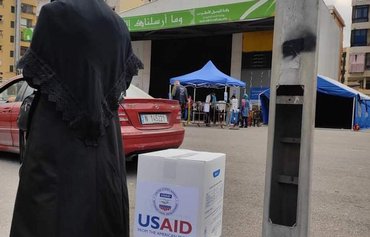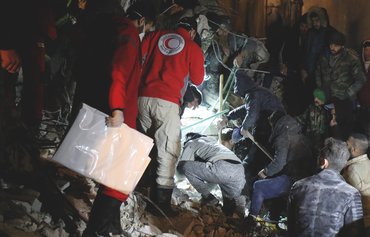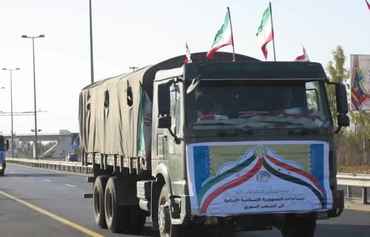CAIRO -- The Syrian regime has been siphoning off international aid intended for the Syrian people, taking it out of the mouths of civilians and using it to fund its forces and enrich its cronies, observers say.
The regime has exploited international humanitarian aid allocated to its people "in every possible way in order to support its army and affiliated militias", said Syrian economist and Damascus University lecturer Mahmoud Mustafa.
These actions have been taken in a "systematic and deliberate manner over the past several years", he said.
"This is not unusual behaviour for a regime that is carrying out a systematic campaign to exterminate its people only because they oppose it," Mustafa said.
![Tampered labels are seen here on April 10 on an aid box provided by the World Food Programme in the eastern province of Deir Ezzor. [Twitter]](/cnmi_am/images/2022/04/20/34989-syrian-aid-tampering-600_384.jpg)
Tampered labels are seen here on April 10 on an aid box provided by the World Food Programme in the eastern province of Deir Ezzor. [Twitter]
But it will be very challenging to close loopholes and stop aid theft, he noted.
In his opinion, Mustafa said, it will be possible to "close this loophole only through a strict system to monitor the distribution of cash and relief aid to ensure that they reach all of the Syrian people, throughout Syria".
Aid theft most likely started in 2014, when signs of an actual crisis began to appear and the international community decided to help the Syrian people directly, in light of the sanctions imposed on the Syrian government, he said.
The regime of Bashar al-Assad, backed by its Russian and Iranian allies, has been engaged in a brutal crackdown against its own people since 2011.
Wide-scale corruption
The Syrian regime has put great pressure on the employees of international organisations tasked with supervising the distribution of aid, activist Mohammed al-Beik said.
Faced with this pressure, which has put the safety of their employees at risk, international aid organisations have been forced to recruit local residents to complete the aid distribution process, he said.
But in many cases, these individuals are Syrian regime loyalists and are involved "in one way or another" in the theft of food aid, al-Beik said, noting that the aid is held in the regime's warehouses before distribution.
"Some basic items are sometimes stolen from food packages, and only about half of the items reach needy civilians," he said, pointing the finger at "influential individuals" close to the regime for the theft.
Some of the stolen food aid is sold on to regime-affiliated traders, who in turn sell it on the market, al-Beik said.
When it comes to the distribution of humanitarian aid, he said, a massively corrupt system is in place, involving regime loyalists -- officials, soldiers and merchants.
"There is no doubt that the regime's institutions are fully aware of what is happening and turn a blind eye to ensure the loyalty of their [allies]," he said.
Meanwhile, Iran-affiliated militias including Hizbullah -- which are fighting on the side of the Syrian regime in the war -- have been taking advantage of the distress of the local population to consolidate their influence in several areas of Syria.
Rising pattern of abuse
In recent years, journalist Mohammed al-Abdullah said, a large percentage of the funds earmarked for aid was sent directly to the regime.
The Syrian government was then supposed to distribute the funds directly among the civilian population, or use them to buy aid that will then be distributed, he said.
But instead, the government, which receives these funds through its governmental and affiliated private banking channels, has been pocketing a portion of the cash after applying the black market exchange rate, which values the dollar against the national currency at almost twice the official price.
In a February report titled "Rescuing aid in Syria", the Centre for Strategic and International Studies said the Bashar al-Assad government has "manipulated aid for over a decade, withholding aid to opponents and channeling it to allies".
The regime "has succeeded in turning international concern for the misery of its people into a profit centre", the report notes. "It skims, diverts, and redirects assistance to its own purposes, both in areas it controls and by shaping international access to areas it does not."
"This interference has grown more entrenched, and other non-state actors are learning from its example," the report adds, calling on donor governments and the aid community to "break the rising pattern of abuse".
If donor governments are able to do this, "the positive influence of donors and the benefits to the Syrian people would be enormous", the report says.
"If they are unable or unwilling to do so, the failure will haunt the Syrian people for decades to come."

![A mother and son take home food aid they have received from the World Food Programme office in the Syrian city of Aleppo in 2020. [WFP]](/cnmi_am/images/2022/04/20/34987-syrian-food-aid-600_384.jpg)






